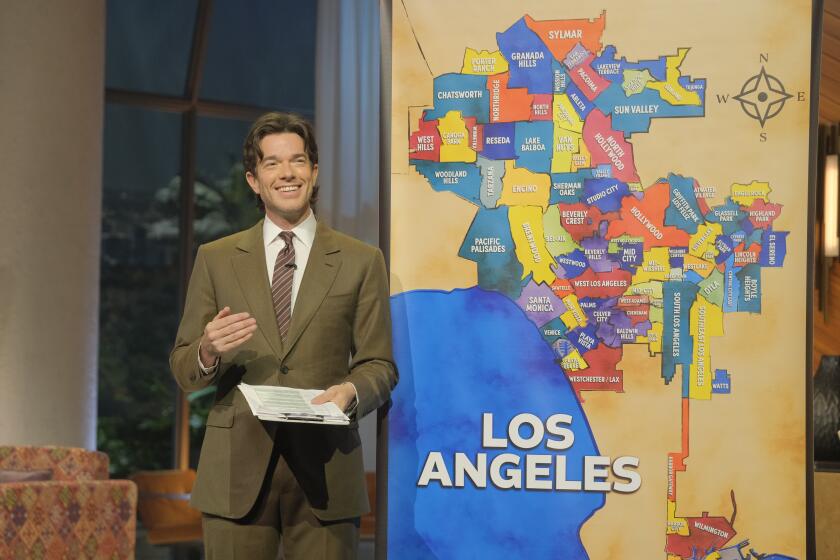The Unsheltered : Martin Sheen Discovers the Distance Between the Haves and the Homeless
Actor Martin Sheen, whose screen credits include “The Missiles of October,” “The Execution of Private Slovik” and “Apocalypse Now,” will soon be seen in a television movie in which he portrays Mitch Snyder, a man who has devoted his life to the homeless. Snyder, leader of the Community for Creative Non-Violence, ended a 32-day hunger strike on behalf of those without shelter March 16 and spent the first week of April in Santa Barbara, which , he charges , is “the worst (city) in the country” in terms of helping the homeless. Recently, CBS news correspondent Charlie Rose interviewed Sheen on location for a special edition of “Nightwatch.”
Charlie Rose: Of all the things you could do, why this? Martin Sheen: Well, I’ll tell you, of all the people in my whole life that I have really envied--and there are just a handful of them--Mitch Snyder is one. And the reason is because he is in full possession of his soul, which is what I would like to be in possession of. I’m sure all of us would. Q: What does it mean to be in full possession of your soul? A: Basically, that he has transcended the image of what it means to be a person to really be a person. One of the first things he asked me when we got together just a few days ago, the first time I met him . . . he asked me to go out andsit on the grate that he had spent four months on and just chat. . . . Well, one of the first things he asked me was: “Martin, how many pairs of shoes do you own?” And I quickly thought, and I said, “I guess about four or five.” He said: “You’re only entitled to one, because there are a lot of people running around out there barefoot.” That’s where he began; I can at best be only a shadow of this man.
There’s nobody, no actor--I don’t care who he is, even probably the best actor of our generation, Robert De Niro--who could really play him because he’s for real, and the best I can do is play at it, because I have never had a homeless person from the street in my home. I have never spent a night in the street with them. I’ve never been truly hungry. I’ve never been truly destitute; I have been spiritually, but never physically--so I can’t identify (with) that pain. Until you can transcend the accouterments that surround the way we isolate ourselves, that create the feeling of being anesthetized toward other people, until you can transcend all the things that we think are us--our clothes, our homes, our insurance, our lives, our children, all the my s, all the me s--until you can transcend those, you can’t meet anyone in that place of least resistance, our common humanity. Mitch Snyder has done that, so I’m only a shadow and just a very pale reflection of his life. Q: Other than talking to him, how’d you prepare for it? How’d you get inside of what it means to be part of this thing called homeless? A: Frankly, I can’t. It’s not possible. We were shooting out here in this very park the other night; it was so bitter cold that we could only work for a little while. Some of the equipment was freezing up. We had to run back into warm cars. Q: You had a place to go. A: We had a place to go, and we were only here for a few hours. As soon as we left, the people that live here, whose living room we were shooting in, came back. Now, they’re there for the night and the next night, and tomorrow night. Q: And they have no escape? A: There is no escape from it. They are at that basic level of survival--just trying to stay alive, in some cases to the next minute, because, you know, they freeze to death. I have no conception of what that is like. It’s not humanly possible for me unless I strip myself of all my possessions and join them in the street. It’s not possible for me to understand where they are. It’s not possible. Q: What have you learned about them? A: I’ve learned that they’re human beings, they’re people, they’re broken, and limited just like all of us, but their brokenness and their limitations are wide open. They’re not covered up by image or ego or any trappings at all. What you see is who they are. Human beings--open, bleeding, freezing, dying right in front of you--and that’s something that, unless you are part of it, it’s not possible to understand. I’ve learned a lot of things from them, and that is that basically I’m no different than them and they’re no different than me. Q: Do you ever say, Why does this exist in this place, in this surrounding, in this country? A: Yeah, it exists because . . . Q: Somebody didn’t care? A: A lot of reasons. Yeah, basically, because we stopped being human. Somewhere along the line, we got so involved with trying to be something that we thought was important, that we thought was a dream, the American dream so-called, and that it was important for us to dream that dream together. That’s part of the reason, but basically it’s just our insulation from ourselves as well--psychologically, emotionally, spiritually. We’re isolated from ourselves. You know, we’re basically a Christian country, but if we really examine the document of Christianity--we’ve removed that bleeding, broken corpse from the cross; it’s no longer a crucifix, it’s a cross. It’s just a symbol of Christianity. We’re not real Christians because we’ve taken the man who inspired us all, the hero of Christianity, away from the cross. We don’t want to see the bleeding, broken, lonely, assassinated Jew hanging alone. Q: And so in America, those that could make the difference refuse to look, refuse to be affected? A: Can’t look. Can’t look because as soon as you look, you recognize you must respond, and in order to respond it means you must give up some of what you have--and to give that up is terrifying. It’s frightening. It scares the hell out of you. It scares the hell out of me. I don’t have the guts to do it. I don’t have the guts to go to prison--where I belong. Q: For conscience? A: For conscience! We all belong in prison, but instead we’ve created our own isolated little physical prisons, and we let things go on and we don’t get involved. We don’t take responsibility for what’s going on; and as long as we continue to give that responsibility to the government, it gets strong and we get weak, just like you and I. If I carry you, I get real strong, you get weak. It’s coming down to the point now where I have to set you down so you get strong; I have to let you go so you get strong. And that means you have to take the responsibility for walking with me, not way behind me or in front of me, but sharing the responsibility of government. . . . We are the government, and if Americans were truly made aware of what’s going on in this country in their name, with their taxpaying money, they would object and they would respond, because Americans are good and decent people, but they’re not aware. The country has become anesthetized to feeling the pain of those on the outside of the good life.
The complete guide to home viewing
Get Screen Gab for everything about the TV shows and streaming movies everyone’s talking about.
You may occasionally receive promotional content from the Los Angeles Times.



